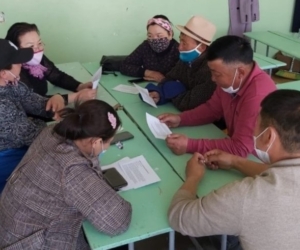WOLTS 2020 – Gender training, blogs and more
14 December 2020
All in all, despite COVID-19, the WOLTS team have had a highly productive year. In 2020 we’ve been adapting, taking stock, writing blogs, and concluding our pilot ‘gender and land champions’ training programme in Mongolia and Tanzania.
Mokoro’s project partners – People Centered Conservation (PCC) in Mongolia and HakiMadini in Tanzania – have successfully completed Round 2 of our four-step training programme on gender and land with community champions, incorporating mentors from among those trained in Round 1. While our training sessions were put on hold in March and April, the team adapted our approach to ensure that the programme could continue safely after lockdowns ended. By the time of writing this update at year end, extensive feedback gathering has also been completed, to help us assess how useful and engaging the training has been, and what wider impacts have been felt in the communities as a result of the entire WOLTS programme.
The WOLTS team’s frequent visits to the study communities have elicited new evidence and stories that inspired six blogs we co-published with the Land Portal in 2020. In January, Team Leader Elizabeth Daley wrote a reflective piece titled ‘Putting research into action – One muddy step at a time’, which looked at some of the positive outcomes of our WOLTS project since its inception in 2015.
The ‘WOLTS Team Perspectives’ series was then launched in February, receiving a great response online. The series comprises blogs from different WOLTS team members, beginning with ‘Seats of power – women’s land rights and chairs’ written by HakiMadini’s Joyce Ndakaru. In this blog, Joyce described her upbringing in a traditional and patriarchal Maasai village and reflected on how the WOLTS project has been delivering positive changes to gender relations in similar contexts in seemingly small but significant ways. In March, we published the second blog in the series, by HakiMadini’s Emmanuel Mbise. In ‘How role-play changed two Maasai communities’, Emmanuel reflected on the power of role-plays about women’s land rights performed by participants during the WOLTS champions training sessions. In our third blog from HakiMadini – ‘How Anna Letaiko got her land’, published in April – Ezekiel Kereri explored how the WOLTS training programme on gender equity has given female community champions the confidence to claim their rights to land, and male community champions the confidence and understanding to support them.
Two further blogs were written from the Mongolian perspective, starting with ‘Young WOLTS champions offer hope for Mongolia’s herding future’, published in July by PCC team member Suvd Boldbaatar. Suvd’s blog told the story of a young herder who did not follow his peers to Mongolia’s cities in search of higher education and employment opportunities, but instead became a WOLTS community champion on gender and land. This man is the kind of dynamic young leader who can help to ensure a sustainable future for Mongolia’s traditional way of life. In September, we published ‘How Covid-19 is bringing Mongolia’s herding families back together’, by our PCC colleague B. Munkhtuvshin. This blog looked at the unexpected positive effects that COVID-19 has had on a Mongolian herder family whom Munkhtuvshin previously wrote about in 2019.
We are now taking stock of the rich body of evidence we have gathered through all of our WOLTS activities over the past five years. We look forward to sharing findings from our pilot ‘gender and land champions’ training programme in the first quarter of 2021, and to launching a set of step-by-step guidelines to support participatory, gender-equitable land management in Mongolia. We wish you all well for the holiday season and the coming year, and take this opportunity to congratulate the whole WOLTS team for their tremendous resilience and achievements in a very difficult year.



